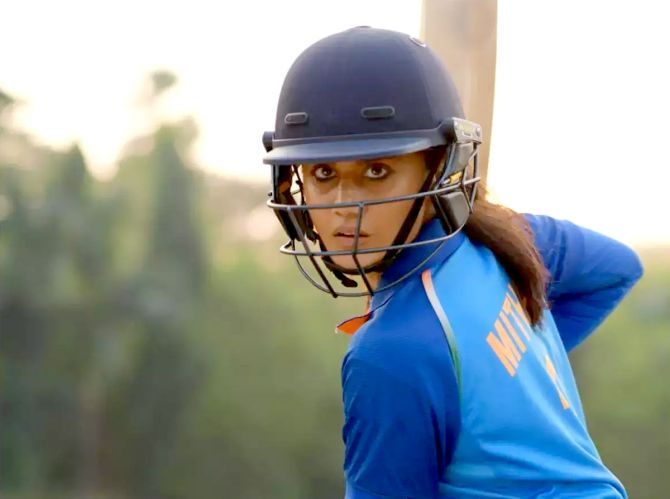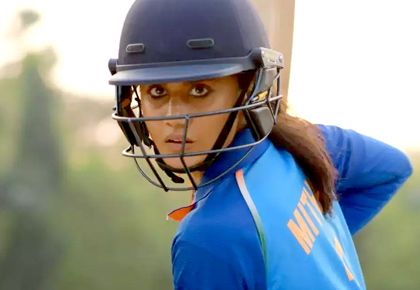
[ad_1]
Two things remain Shabaash Mithu relevant: Taapsee Pannu and the sheer harshness of the Mithali Raj story, observes Deepti Patwardhan.

All good stories deserve a facelift, right?
Srijit Mukherji’s latest film, Shabaash Mithutook that expression and ran with it.
The film remains at the center of Mithali Raj, her journey and how it coincided with the changing times in Indian women’s cricket.
It pays homage to the legendary player who ended her career in June as the all-time leading batter in women’s cricket and led India to two World Cup finals.
The film begins with a disclaimer that this is a fictional play inspired by Mithali’s journey, and the liberties he took with the story begin at the very beginning.
Raj’s introduction to cricket was very different from that portrayed in the film: he was introduced to the game by a cricket-mad friend who resists tradition and boys alike.
While young Mithali (Inayat Verma) is a star Bharata Natyam dancer who was the real Mithali, her friend Noori (Kasturi Jagnam) opens her eyes to a whole new world where girls can play cricket too – albeit hidden from the boys on a secret floor – and dreaming big dreams.
Friendship is at the heart of this tale and the characters are expertly acted but far removed from reality.
This seems to be a recurring problem with the film.
The journey of a middle-class girl with a military background (her father, Dorai Raj, worked in the Indian Air Force and had pushed his children into sports because he didn’t want Mithali to sleep late) reached the pinnacle of success and change in The Cricket The country’s landscape is not considered dramatic enough.
It is, as her first coach Sampath Kumar (Vijay Raaz) says, while the other women on the Indian team made their daily struggles their strength, Mithali’s greatest strength was her technique.
Who is upset by that alone?
Luckily, the film details the making of one of the most technically correct batters India has ever produced.
Vijay Raaz excels in the role of a battle-hardened trainer who helps Mithali take her first steps not only on a batting wicket but in the realities of the sport.
The film also falls victim to the creation of antagonists, most of whom are fictional, to increase the odds for their heroine. Be it the brother, a cricket contender himself who feels jealous and overshadowed by her success, a traditional and disapproving grandmother who leaves home after Mithali gets her first call in India and disappears from the film, or the members of the Indian team who bully and berate her during her early days with the national team.
Many of these added characters are used to highlight the true struggles of Indian female athletes, the pressures and prejudices they face.
Noori, whose character is very different from Mithalis, is forced to marry at the age of 15.
Her teammates from India discuss the economic and social issues Indian women face while trying to pursue their sporting dreams.
It may be a cliche attitude, but unfortunately these cases, these stories, are still rife in the country.
Although the story only loosely follows that of Mithali, the first half is an engaging watch.
We break in for the intermission with possibly the film’s strongest scene, in which the women fight for their identities in a Cricket Association boardroom full of men, rather than living in the shadows or wearing the battered jerseys of the giants’ popular men’s team.
But the film goes completely off the rails and loses all sense of chronology in the second half.
The most problematic passage is when she returns home after the boardroom defiance.
First, we don’t know if she was fired or resigned.
Second, one of the hallmarks of Mithali’s 23-year career has been her utter stubbornness to hold her own no matter how bad things were going.
Her withdrawal from the game and conceding defeat seems uncharacteristic of the real Mithali.
As the film spans her days as a cricket novice to her appointment as captain at the age of 22, there is a gaping gap between 2005 and the 2017 World Cup, which marked a turning point for Indian women’s cricket.
The film doesn’t even allow for a highlight role for the 2005 World Cup, when Indian women reached the final for the first time.
Meanwhile, the 2017 World Cup is dismissed in a maelstrom of Mondays after a massive build-up after a mandatory pep talk from Mithali in the dressing room.
The archival footage used in this is shrill mixed in, sometimes the names of real Indian team members are visible on the scoreboard when no such characters exist in the film.
Sometimes you see the real Mithali, and the next moment she turns into Taapsee Pannu and plays Mithali.
Despite the glaring failures, two things keep the film relevant: Taapsee Pannu and the sheer harshness of the Mithali Raj story.
Pannu captures Mithali’s dualism of being a silent leader.
Mithali Raj was an eloquent but largely unemotional captain whose strength remained balanced no matter the odds or opponents, no matter how inexperienced the team.
Pannu plays this role in measured tones.
There’s no over-the-top pose, even delivering the line that has made Mithali a poster child for gender equality.
When asked by a tactless reporter about her favorite cricketer, she replies, “Do you ask male cricketers who your favorite female cricketer is?”
While the film doesn’t quite do it justice, it’s a story that needed to be told.
Women’s cricket has come a long way since Mithali made her debut in 1999 when it was still an amateur pursuit.
For more than two decades, she has led the sport’s fight against administration and indifference – the sheer outrage that the women’s cricket team, despite being a national cricket team, has had to face just to keep playing.
Her strength of character brought women’s cricket forward and center stage.
And that’s the message with which the film rightly ends.
With people showering the team with love and attention despite failing to win the 2017 World Cup final, from young girls inspired to play cricket by idols like Mithali.
Rediff Rating:

